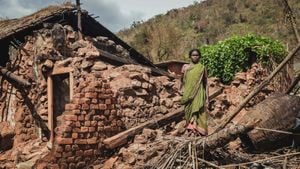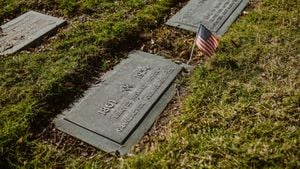Across the globe, the echoes of conflict resonate, as Israel's military actions in Lebanon and Gaza continue to stir intense international condemnation. From the bombed remnants of buildings to the stories of those fleeing violence, these events tug on the hearts and political strings of nations, sparking debates on humanitarian crises and military ethics.
On November 17, 2024, an Israeli airstrike targeted a dense residential area of Beirut, killing Mohammad Afif, the head of Hezbollah's media relations. Reportedly, Afif was inside the building at the time of the attack, which sent shockwaves through the community. His death was confirmed by the Secretary-General of the Arab Socialist Baath Party, Ali Hijazi, during a conversation with the Lebanese media outlet, Al Mayadeen. Hijazi stressed the significance of Afif as not just another casualty but someone whose voice mobilized resistance against what he called Israeli aggression.
Hezbollah's response underscored the complexity of the situation, explaining their longstanding skirmishes with Israel dating back over the last year. These escalations began following Hamas's blood-soaked assault on southern Israel on October 7, 2023. Since then, Israeli forces have relentlessly bombarded southern and eastern Lebanon, with the most recent strikes resulting in Afif's death and drawing criticism for the apparent disregard for civilian lives.
Witnesses describe the chaos following the strikes. Reports from the scene indicate the neighborhood was stuffed with civilians seeking refuge from earlier bombings. Civil defense teams raced against time to rescue souls from the debris as gunfire rang out to keep crowds at bay. Meanwhile, the Israeli military declined to comment on the attack, raising eyebrows as no evacuation orders had circulated before the disaster.
Such devastating strikes are not isolated to Lebanon. Just one day before Afif's death, ten lives were lost due to another Israeli airstrike at a United Nations-run school located within Gaza's Shati refugee camp. This bombing marked yet another grim day for Palestinians, who have borne the brunt of military aggression this year. After months of siege and warfare, reports indicate widespread destruction across northern Gaza, with testimonies painting a picture of devastation and despair.
Accounts from survivors detail horrific scenes at the Kamal Adwan hospital, which was subjected to raiding by Israeli Defense Forces. Eyewitnesses allege Israeli troops beat patients and destroyed medical supplies during their siege, which occurred just before they launched airstrikes on the hospital area. This has cast significant doubts on Israel's claims of precision strikes aimed solely at Hamas militants.
Humanitarian responders describe the hospital's plight as tragic. It was simultaneously functioning as both treatment and refuge for about 300 Palestinians driven from their homes due to the damage inflicted by Israeli airstrikes. Those who sought shelter faced additional attack, which not only robbed them of their homes but also assistance from the medical facilities tasked with caring for the injured.
Further complicity arose internationally as Pope Francis recently suggested the need for investigations to ascertain whether the attacks by Israel might amount to genocide against the Palestinian people, fueling calls for accountability from various global leaders and institutions. He emphasized the urgency for the international community to take note of the 'desperate cries' of victims.
The response from various governments has been polarizing. Australia's stance, for example, recently shifted as it acknowledged the sovereignty of Palestine, raising concerns among its citizens who voiced their alarm over Israeli actions. Images and news circulating on social media around the world only amplify fears of recurrent violence.
Pope Francis's remarks come amid broader accusations from the United Nations, which described several of Israel's military endeavors against Gaza as constituting genocidal patterns. Israel fired back, rejecting these claims outright, which adds another layer to the already complex international relations surrounding the conflict.
These developments occur against the backdrop of rising Islamophobia observed within Australia, particularly following Hamas's initial attack on Israel. Reports suggest incidents of anti-Muslim discrimination skyrocketed, creating furor within the Lebanese community, which holds deep ties to the strife occurring abroad. Activists have expressed concerns about increasing hostility and polarizing narratives impacting their communities back home.
The Australian Lebanese community, now thrilled against the backdrop of recent civil war memories from the late 20th century, finds itself mourning lives lost and advocating against aggression. The realization just how deeply the conflict can resonate even eight thousand miles away is causing ripples of anxiety across local neighborhoods.
Protests have also erupted within Australia, primarily focused on bringing attention to the humanitarian disaster transpiring within Gaza. These demonstrations stress solidarity with those enduring hardships and push for more nuanced understandings of the conflict - one where civilians bear the scars of war the most.
Michael Kheirallah, chairman of the Victorian Lebanese Community Council, articulated the struggle of individuals who are now once more grappling with harrowing recollections of loss due to aggression directed toward familiar terrains. Local events held to honor those impacted have united both Muslims and Christians as they seek solace and solidarity amid the chaos.
The story of the Lebanese community reflects not just their past but also the resilience and responsiveness of those living abroad. Ahmed, one Australian citizen who recently returned from Lebanon amid rising attacks, illustrated the chaos of fleeing— of family members torn from one another, each seeking safety from the relentless bombardment.
Events of the recent weeks highlight the urgency of addressing the plight of civilians caught between power struggles. Calls for negotiations, ceasefires, and international scrutiny are more pressing than ever. Although Israel continues to defend its actions as necessary for national security, the toll on human life and the rise of international condemnation pose questions on the ethics of military power.
Moving forward, the potential for rising tensions both domestically and internationally remain high, at the beck and call of each new day’s news. Addressing the humanitarian crises resulting from military actions may require countries to rethink their engagement strategies and relook at their histories, not just of this conflict but of conflicts similar across the globe.
Only time will tell how the global community will respond to the tangled tales of suffering and loss—from the bloody streets of Beirut to the desolate refugee tents within Gaza. Caught within this web of conflict are peoples bound by shared histories of resilience, pain, and collective memory.



